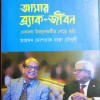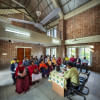Peace Café – How a student-led platform is transforming thousands of lives across Bangladesh

Tahmina Akhter Habiba was always disturbed by the sufferings of others. She helped whomever and whenever she could, but her individual efforts could only benefit a few people.
It wasn't until a few years later when she enrolled in Brac University and founded the Peace Café that she and many others like her understood what they really had to do and how they would do it as a team.
Tahmina is now the President of the Peace Café at Brac University, which has grown to over 150 members within just two years since its inception.
Peace Café was co-created by the Centre for Peace and Justice (CPJ), a multidisciplinary academic institute at Brac University, and UN Women Bangladesh. However, its expansion has not been kept limited to Brac University.
Apart from Brac University, Peace Café is present at four other universities in Bangladesh including Begum Rokeya University, Jatiya Kabi Kazi Nazrul Islam University, University of Dhaka, and Asian University for Women.

Decoding the concept of Peace Café and its objectives
With the support of UN Women, CPJ has been implementing a flagship programme called "Empowered Women, Peaceful Communities" since 2018 in Bangladesh. CPJ facilitated the establishment of Peace Cafés as an innovative and pioneering initiative to promote peace and social cohesion as part of the project. Peace Café nurtures and mentors student-led civic engagement and social entrepreneurship activities for peacebuilding and social cohesion.
Speaking about the initiative and key objectives of Peace Café, Shahariar Sadat, Director for Academic and Legal Empowerment, CPJ said, "The Peace Café provides a forum for developing youth leadership in a non-political way. Young people can learn about the communities they are from and live with. It is an opportunity for any educational institution to create its relevance for the community around it."
"One of the key objectives is to develop soft skills like leadership, digital literacy, and social entrepreneurship and create a better understanding of peace, social cohesion, diversity, plurality, inclusivity, and tolerance among other issues. Students and communities in and beyond the campus can use the Peace Café as a hub of civic engagement and experiential learning," he added.
Notable achievements of Peace Café
So far, Peace Café has trained around 1067 students in skill development, while also implementing 18 student-led community welfare initiatives, and creating content for knowledge generation.
Tahmina, however, believes that the greatest success of Peace Café has been in inspiring a large number of students to participate in and initiate various community welfare initiatives on their own.
"Since we began operating, we have observed a great change in the mindset of many students at our university," said Tahmina. "This has happened because we were successful in getting them to understand how crucial it is to address the problems we are trying to solve."
"We can see that they are taking initiatives by themselves to solve these issues in the areas where they live, and they occasionally approach us with new ideas to work on. This eagerness was largely absent before the establishment of Peace Café," she added.
Faijah Omar Turna, Vice President, Women Peace Café, Jatiya Kabi Kazi Nazrul Islam University, expressed a similar sense of relief and pride in highlighting the success of Peace Café at her institution.
"We've gathered more than 400 members in just three years. I've noticed a significant shift in their attitude towards resolving social issues since joining Peace Café," said Turna. "They have grown more confident, cautious, and knowledgeable because of the training we have provided them thus far."
"The fact that both members and non-members come to us with new ideas almost every day demonstrates that we have successfully piqued their interest in resolving social issues, and it also gives me the confidence to tell you now that we are on the right track. I've also noticed and received equal enthusiasm and support from male and female students for our initiatives and this motivates me even more," she added.

Marching full steam ahead to transcend borders
When asked what direction he would like to see Peace Café take in the future, Manzoor Hasan, OBE, the Executive Director of CPJ stated with high hopes, "It is a growing network of young men and women working to create a society that is inclusive, tolerant, modern, and skilled. In the next ten years, CPJ aims to build on existing foundations and explore new avenues to bring youth voices to the centre. We hope to inspire people of all ages to come forward and work for the community through the youth."
He added, "CPJ plans to continue to work with university students across the country to strengthen their skills and facilitate spades for their participation in local, national and global discourses on relevant issues (e.g., peace, social cohesion, climate change, gender equality, human rights)."
"In parallel to its in-country work, CPJ wants to explore the potential to collaborate with universities and organisations in other countries in South Asia to build a regional Peace Café network," he concluded.
Indeed, if the youth can gain leadership knowledge, skills, network and mentorship support through the work of Peace Café, they will be able to become active citizens. Furthermore, this will give them credibility in their own communities and provide them with opportunities to share their perspectives with various government actors, resulting in more participatory and inclusive decision-making and policy formulation at multiple levels.
Md. Wahidul Islam is a communications officer at CPJ and Arafat Reza is a consultant at CPJ.

 For all latest news, follow The Daily Star's Google News channel.
For all latest news, follow The Daily Star's Google News channel. 








Comments